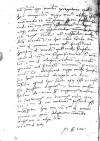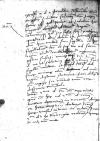Scripsit nobis nuper dominus ⌊Ioannes a Werden⌋, communis noster amicus, longo sermone de bello Danico, quod nunc inter illustrissimum ⌊ducem Holsatiae⌋ et ⌊Lubicenses⌋ viget, consulens, quo a nobis vel ⌊maiestate regia⌋ duci pecuniario subsidio occulte succurretur, ne ⌊comes⌋ et Lubicenses de illo ⌊regno⌋ victoria potirentur, quae procul dubio cessura esset in nostrum ⌊Prutenorum⌋ praecipue successu temporis magnam iacturam et detrimentum, addens se modum scire, quod auxilium hoc sine magno negotio a regia maiestate ac modicis consiliariis scientibus duci praestari posset, sed mihi modum non expressit. ⌊Cui⌋ respondi, si mihi descripsisset viam, quod hoc praesidium sine incommodo gravi ⌊regiae maiestatis⌋ etc. ⌊duci Holsatiae⌋ exhiberi possit, irem in ipsius sententiam non modo pedibus, sed et manibus. At cum ⌊rex⌋ non esset a ⌊Moscis⌋, ⌊Tartaris⌋, ⌊Vallachis⌋ durissimis bellis implicatus, quod et hic in ⌊patria nunc nostra⌋ in horam metuendum est, eapropter
non scirem ego modum excogitare, quod hoc auxilium regiae maiestati absque ipsius incommodo et non gravi praeponi possit et inde non eius animus offenderetur, qui atque adeo in exponendis nummis tenax est etc. Nondum autem respondit mihi dominus ⌊Werden⌋, et hoc ideo scribo Vestrae Reverendissimae Dominationi manu mea, quod, praesumam hoc ipsum, dominus Werden quod mihi scripsit, etiam Dominationi Vestrae Reverendissimae significaverit. Si autem Vestrae Reverendissimae Dominationi aliquem ordinem et modum, quomodo ad praemissum iuvamen perveniendum sit, detexerit, rogo mihi hoc ipsum per hunc nuntium detegere et sua consilia, quid hoc factu opus esse ei visum sit, impertiri dignetur. Nova nulla habeo de novo ⌊papa⌋, Ungaricis, Moscis et Tartaricis ac Turcicis rebus, quae Vestrae Reverendissimae Dominationi, ut autumem, possint esse incomperta. His me Vestrae Reverendissimae Dominationis amori, favori et gratiae diligenter commendo.
Datae
ut in aliis litteris.
Vestrae Reverendissimae Dominationis totus ⌊Mauritius episcopus Warmiensis⌋
Postscript:
De ⌊conventu⌋ anticipando tametsi nunc aliorum dominorum sententiam tam repente scribere Reverendissima Dominatio Vestra non valeat, ut saltem cum hoc nuntio mihi suam indicet precor. Cum haec scriberem, redditae mihi fuere litterae Reverendissimae Dominationis Vestrae per eius puerum, quibus in primis mentionem facit de causa domini ⌊Custka⌋. Ea etiam die accepi litteras reverendissimi ⌊episcopi Primisliensis⌋ in praedicta causa de et super meis responsales, quas cum praesentibus mitto. Quid enim desiderat, ex eis Vestra Reverendissima Dominatio intelliget, ego autem ne errorem committam, nihil mittam nec scribam, sed supersedebo usque ad proximum ⌊conventum⌋ et tunc mecum feram, quae apud me exstant in causa praefata documenta. Quod et Reverendissima Dominatio Vestra pariter ita facere velit, rogo, quod in praedicto futuro ⌊conventu⌋ nostra consilia conferre et ex eodem ⌊domino Primisliensi⌋ seu ⌊regi⌋ seriem huius rei concordibus votis respondere et iterum absque obiectione cavillationis cuncta repetere valeamus. Venit ad nos die Natalis Domini dominus ⌊castellanus Gdanensis⌋, quid autem hic congessimus, copia his indita Vestrae Reverendissimae Dominationi declarabit. Si quid etiam voluerit quippiam addere aut minuere in hoc negotio relinquimus
excelsae Reverendissimae Dominationis Vestrae prudentiae conferendo etiam in domino ⌊palatino Culmensi⌋, nam putamus satis esse, quod praelati et palatini hoc negotium dirigant ad ⌊maiestatem regiam⌋.
Nota: Convenimusque, quod pro festo sancti Anthonii, quod erit die Dominica 17 Ianuarii, praefati domini huc mittant sua sigilla et hic sigillabuntur litterae et per me ad sacram ⌊regiam maiestatem⌋ mittentur, quod ingravate explere suscepi. Curet nisi Vestra Reverendissima Dominatio, ut et ⌊palatinus Culmensis⌋ suum sigillum mittat et si quid litterarum ad suos amicos, etiam ad aulam regiam destinare statuerit pari diligentia cum regiis per nuntium meum eas disponere mandabo.
Litteras Reverendissimae Dominationis Vestrae cum meo nuntio, quem cum his ad Reverendissimam Dominationem Vestram mittere decreveram, in ⌊Warmiam⌋ direxi ea hora receptionis dictarum litterarum. Has rursum retinui in reditum pueri Reverendissimae Dominationis Vestrae ex ⌊Monteregio⌋ redeuntis, quas cum eodem nunc mitto.



